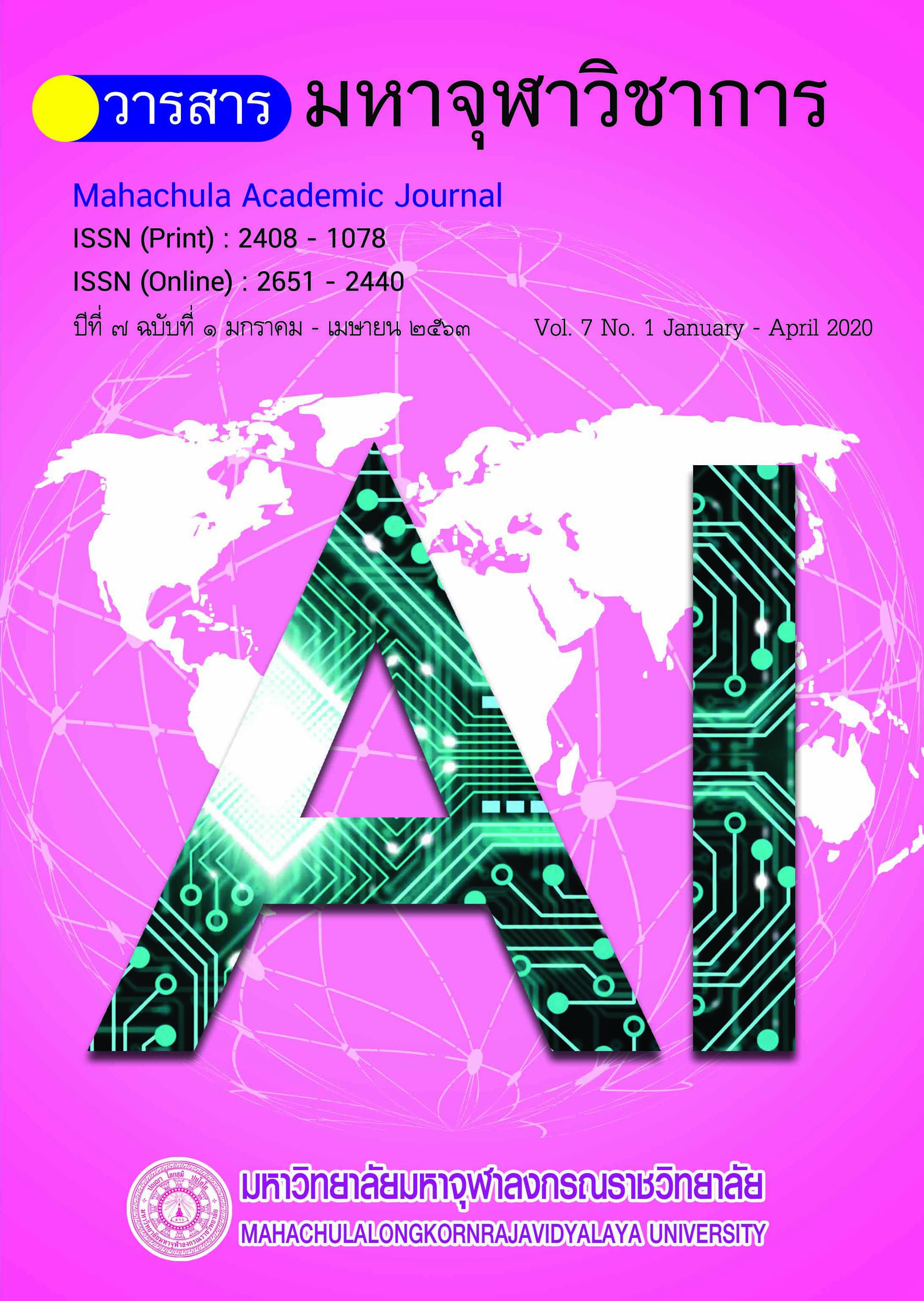Adoption of Sufficiency Economy Principle adhering to Buddhist- oriented practice to business organizations
Main Article Content
Abstract
The Sufficiency Economy Principle that His Majesty King Rama IX graciously gave royal speeches to Thai people is not only limited to agricultural use. Able to apply the Sufficiency Economy Principles in the management of business organizations for the sustainable existence of the organization and the economic development plan of the National Economic and Social Development Agency National Economic and Social Development plan (No.12) by adhering to the Sufficiency Economy Philosophy in defining the vision of the National Strategic Framework to propel Thailand with sustainability under the economic trauma that occurred under the volatility of the current Thai economic conditions, based on 3 principles follow as; modesty, reasonableness, and self-immunity on 2 conditions are the use of moral knowledge principles and precaution which makes the Thai business organizations able to run their business by self-reliance and sustainability.
Article Details
References
นิภา วิริยะพิพัฒน์. “ผู้นำเศรษฐกิจกับการขับเคลื่อนเศรษฐกิจพอเพียงในองค์การ”. วารสารวิชาการ. มหาวิทยาลัยหอการค้าไทย ปีที่ ๒๙ ฉบับที่ ๔ (ตุลาคม-ธันวาคม ๒๕๕๒).
ประสพโชค มั่งสวัสดิ์. “ปรัชญาของเศรษฐกิจพอเพียงกับการบริหารเศรษฐกิจ”. วารสารพัฒนบริหารศาสตร์. ปีที่ ๔๗ ฉบับที่ ๑ (๒๕๕๐).
ศูนย์ศึกษาเศรษฐกิจพอเพียงสถาบันบัณฑิตพัฒนบริหารศาสตร์. ปรัชญาเศรษฐกิจพอเพียง. กรุงเทพมหานคร: โรงพิมพ์ศูนย์ศึกษาเศรษฐกิจพอเพียง, ๒๕๕๑.
อุดม อมรธรรม. ปรัชญาเศรษฐกิจพอเพียงพระเจ้าอยู่หัว. พิมพ์ครั้งที่ ๒. กรุงเทพมหานคร: โรงพิมพ์แสงดาว, ๒๕๕๑.
บริษัท ปูนซีเมนต์ไทย จำกัด (มหาชน). “รายงานประจำปี ๒๕๕๙”. [ออนไลน์]. แหล่งที่มา : http://www.scg-th.listedcompany.com. [๑๔ ธันวาคม ๒๕๖๑].
โพสต์ทูเดย์. “ทางรอดโตชิบา”, ๒๕๖๐. ออนไลน์]. แหล่งที่มา: http://www.posttoday.com. [๑๓ มกราคม ๒๕๖๒].
มหาจุฬาลงกรณราชวิทยาลัย “พระไตรปิฎกออนไลน์ ฉบับมหาจุฬาลงกรณ์ราชวิทยาลัย ๔๕ เล่ม ”. [ออนไลน์]. แหล่งที่มา: https://tripitaka-online.blogspot.com/2016/07/tpd24-01.html [๑๕ มีนาคม ๒๕๖๓].
มูลนิธิชัยพัฒนา. “จุดเริ่มต้นแนวคิดเศรษฐกิจพอเพียง”. [ออนไลน์]. แหล่งที่มา: http://www.chaipat.or.th>site_content. [๑๑ มกราคม ๒๕๖๒].
วีระพงษ์ รามางกูร. “ข่าวเศรษฐกิจครึ่งแรกของปี ๒๕๖๐”. [ออนไลน์]. แหล่งที่มา : http://www.matichon.co.th/news/601210. [๕ ธันวาคม ๒๕๖๑].
สำนักงานเศรษฐกิจและสังคมแห่งชาติ. สรุปสาระสำคัญแผนพัฒนาเศรษฐกิจและสังคมแห่งชาติฉบับที่๑๒, ๒๕๖๐. [ออนไลน์]. แหล่งที่มา : http://www.nesdb.go.th. [๑๔ ธันวาคม ๒๕๖๑].
อาชว์ เตาลานนท์. “การประยุกต์ใช้ปรัชญาของเศรษฐกิจพอเพียงของภาคเอกชน”. มูลนิธิสถาบันวิจัยและพัฒนาประเทศตามปรัชญาของเศรษฐกิจพอเพียง สำนักงานกรรมการพัฒนาการเศรษฐกิจและสังคมแห่งชาติ. ออนไลน์]. แหล่งที่มา: http://www.social.nesdb.go.th. [๑๐ ธันวาคม ๒๕๖๐].
ASTV ผู้จัดการออนไลน์. “โฟร์คสวาแกน 2558.” [ออนไลน์]. แหล่งที่มา: http://www.manager.co.th/home/astv. [๑ พฤศจิกายน ๒๕๖๑].


